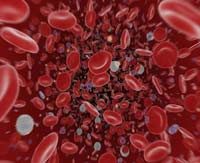Nonclinical studies suggest that ginger may be useful as anti-thrombotic and anti-inflammatory agent and may impact the cardiovascular system
Effect on Blood Clotting
The effect of an aqueous extract of ginger on platelet thromboxane-B2 (TBX2) and prostaglandin-E2 (PGE2) production was examined after giving rats a raw aqueous extract of ginger daily for a period of 4 weeks, either orally or intraperitoneally (IP). A low dose of an aqueous extract of ginger (50 mg/kg) administered either orally or IP did not produce any significant reduction in the serum TBX2 levels (Thomson et al., 2002).

However, ginger (non-extracted) administered orally caused significant changes in the serum PGE2 at this dose. High doses of ginger (500 mg/kg) were significantly effective in lowering serum PGE2 when given either orally or IP. However, TXB2 levels were significantly lower in rats given 500 mg/kg ginger orally, but not IP. These results suggest that ginger could be used as an anti-thrombotic and anti-inflammatory agent (Thomson et al., 2002).
Srivastava (1984 and 1986), Suekawa et al. (1986) and Srivas (1984) reported that ginger extracts inhibit platelet aggregation induced by arachidonic acid, epinephrine, ADP or collagen based on in vitro studies. However, Weidner et al. (2000) and Jiang et al. (2005) found that in vivo, there was no significant effect on coagulation or on the warfarin response that was found in the rat following multiple 100 mg/kg doses of ginger extract. Jiang et al. (2005) suggest that this is because the ability to control the different variables (such as different herbal products being used, the proportions, study design, etc.) across the studies is next to impossible.
Animal studies demonstrate that the effects on the cardiovascular system are anti-oxidative as well as androgenic (Chrubasik et al., 2005).
References:
- Chrubasik S, Pittler M and Roufogalis B. (2005). Zingiberis Rhizoma: a comprehensive review on the ginger effect and efficacy profiles. Phytomedicine. 12(9): 684-701.
- Jiang X, Williams K, Liauw W, Ammit A, Roufogalis B, Duke C, Day R and McLachlan A. (2005). Effect of ginkgo and ginger on the pharmacokinetics and pharmacodynamics of warfarin in healthy subjects. Br J Clin Pharmacol. 59(4): 425-32.
- Srivas K. (1984). Effects of aqueous extracts of onion, garlic and ginger on platelet aggregation and metabolism of arachidonic acid in the blood vascular system: in vitro study. Prostaglandins Leukot Med. 13(2): 227-35.
- Srivastava K. (1984). Aqueous extracts of onion, garlic and ginger inhibit platelet aggregation and alter arachidonic acid metabolism. Biomed Biochim Acta. 43(8-9): S335-46.
- Srivastava K. (1986). Isolation and effects of some ginger components of platelet aggregation and eicosanoid biosynthesis. Prostaglandins Leukot Med. 25(2-3): 187-98.
- Suekawa M, Yuasa K, Isono M and Sone H. (1986). Pharmacological studies on ginger IV. Effect of 6-shogaol on the arachidonic cascade. Nippon Yakurigaku Zasshi. 88(4): 263 – 9.
- Thomson M, Al-Qattan K, Al-Sawan S, Alnaqeeb M, Khan I and Ali M. (2002). The use of ginger (Zingiber officinale Rosc.) as a potential anti-inflammatory and antithrombotic agent. Prostaglandins Leukot. Essent. Fatty Acid. 67, 475–478.
- Weidner M and Sigwart K. (2000). The safety of a ginger extract in the rat. J Ethnopharmacol. 73(3): 513-20.